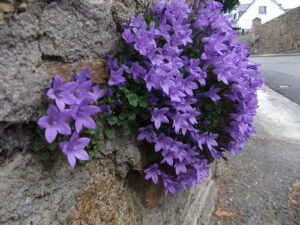Less is More: A Sonnet Sequence about Profoundly Paunchy Poetry as Opposed to Perfect Poetry
Modern poetry modern verse contemporary poetry contemporary verse modern poem contemporary poem
 “Flower in the Crannied Wall” ~ Alfred, Lord Tennyson
“Flower in the Crannied Wall” ~ Alfred, Lord Tennyson
“That a long poem is a flat contradiction in terms,” has excited the opposition of some critics, and with apparent reason; and yet on the whole it is surely better that such a notion should obtain among literary aspirants than the old one, which I am sorry to say is still current, that no poem can be termed great that is not a long one. ” ~ Joseph Skipsey writing about the thoughts of Edgar Allen Poe.
Mocking Epics; and The Point of Whopping Poems
When skirmish turns to battle, turns to war,
When chieftain turns to monarch, wide-winged king,
When poetry becomes an epic, more,
A saga, legend, armored myth . . . lyres sing
Of petty princes, petty fighters like
Odysseus, Achilles and their ilk.
A Homer makes a great big deal of pike
Through eyeball. The intention is to bilk
Some royal court that’s hearing lines in Greece
Or Wales–wherever. Sitting on a throne
The listener who matters is obese
With pride, requiring verse that’s overblown.
A perfect sonnet wouldn’t do these guys.
Their worth must be inflated in their eyes.
Epic Similes: Mini Cosmoses
“ ‘Why did the whole Greek world exult over the combat scenes in the Iliad?’ asks Friedrich
Nietzsche. We modern readers do not even begin to understand them ‘in a sufficiently
“Greek” manner’. If we understood them in Greek, ‘we should shudder’. Nietzsche does not
mean in the Greek language but in the Greek spirit. Whoever reads the Iliad … has to come
to terms with the profound ‘otherness’ of one of the very traditions which lie at the root of
ours.” ~ Michael Schmidt, The First Poets, 17
The many mustered people working on
The efforts of the Allies’ war against
The Axis powers (that toxic trilithon)
Were not enough, though hugely well fornenst
To win the war without the tiny groups
Who sparked the strongest wins, those Bletchly Park,
Manhattan Project boffins, thinkers troupes
Of minds. The meaning, therefore, harshly stark,
Hulks large: small matters matter. Some might write
An epic, long and long, but smaller parts
Of it are better than the whole. The light
Of stars outshines dark space’s pallest parts.
The shining similes of Homer’s vast
Works save his wholes, though epics leave aghast.
Sonnets as Synechdoche
Let’s choose a Shakespeare sonnet out of all
One fifty-four, pick out with tasteful eyes
From that long sequence. Might it not appall?
It looms with clever human need, witty and wise.
(One reader is too easily appalled.)
Then scholars scrape around in sonnets yonks
And yonks, deep intellects completely stalled
In working out the poems’ meanings. Bronx
Cheers greet interpretations till at last
An academic finds the key to tell
Us what the stanzas’ puzzle says. It’s vast
And fun, this sequence, plenty to compel.
Some people sneer at sonnets, yet they win.
In light of this, most epics seem too thin.
“She Walks in Beauty”
“Where Delos rose”
I’d sink the whole of Homer for a song
By Keats, except the similes inside
The Iliad, those little bits. Too long
The epic, but the lovely “silent bride
of quietness” and Keats’s “foster-child
Of silence and slow time” prove lyrics in
The realm of poetry wait undefiled
Against the bloated epics. They are sin
Contrasted with the caged, strict shortness of
The purities of Thomas, Shelley, Keats
And Shakespeare lyrics. Let the ones who love
Long poems nuzzle up and suck those teats.
I read an epic three times. That was quite
Enough. The heft of epics is their blight.
“all evil shed away”
Slough off the minds that hate high lyrics. Send
Them to the depths, say, Mariana Trench.
Such critics condescend. Instead, ascend
To glories far away from stupid stench
Of brainless ignorance. Uphold perfumes
From perfect poems far away from bloats
Of epic bellies belching from the tombs
Of fester spheres. Allow the long-loved notes
Of ever-living, ever-singing lines.
Allow the poets of those words to sing
Despite that sneering. Heart-embrace designs
Much briefer, soaring up on skylark wing.
All hail to thee, blythe spirits, in your quest
For consummate short poetry, the best.
Epic Schmepic
To see a World in a Grain of Sand
And a Heaven in a Wild Flower,
Hold Infinity in the palm of your hand
And Eternity in an hour. ~ William Blake